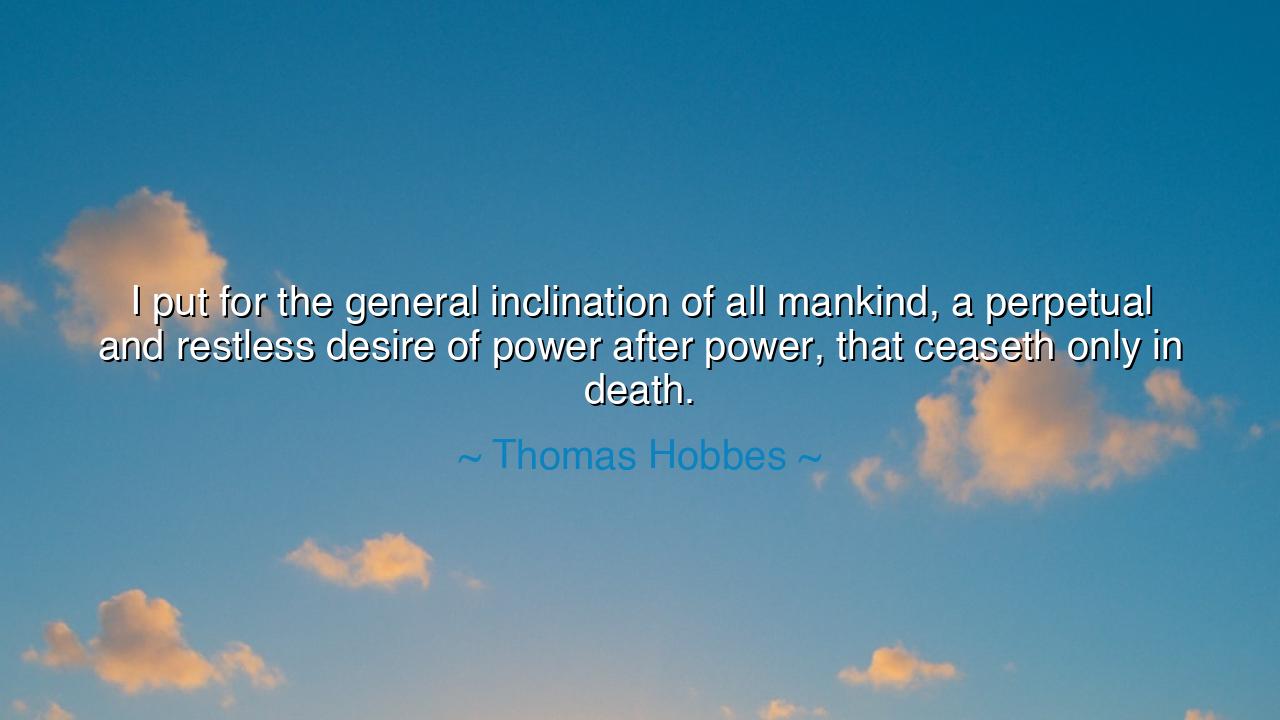
I put for the general inclination of all mankind, a perpetual and
I put for the general inclination of all mankind, a perpetual and restless desire of power after power, that ceaseth only in death.






In the councils of elder voices, hear Thomas Hobbes lay down a hard, clarifying law of the heart: “I put for the general inclination of all mankind, a perpetual and restless desire of power after power, that ceaseth only in death.” The sentence moves like iron—sober, weighty, without ornament. Hobbes does not accuse a few ambitious souls; he describes the common pulse: a ceaseless reaching, hand over hand, rung after rung, until the climb ends in the hush none may escape. He is not praising this hunger; he is naming it, so politics can be built to guard us from its storms.
The meaning is double. First, Hobbes insists that our desires do not settle; today’s sufficiency becomes tomorrow’s starting line. Power once gained must be secured; security demands more means; means awaken new desires. Thus the circle turns, “perpetual and restless,” until death breaks the wheel. Second, he warns that this ordinary restlessness—left without common restraints—breeds rivalry, suspicion, and conflict. The point is not to shame human nature but to understand it, so that we might trade the war of all against all for the peace of a well-framed commonwealth.
The origin of the line is Leviathan (1651), Book I, Chapter XI, “Of the Difference of Manners.” There Hobbes sets out the passions that drive conduct and openly states the famous claim: a “perpetuall and restlesse desire of Power after power, that ceaseth onely in Death.” He immediately explains that the cause is not mere greed for sharper pleasure, but the need to assure the power and means to live well—which requires ever more power to ward off loss. This is the engine that, in later chapters, forces men to covenant and authorize a sovereign, lest their restless seeking dissolve into civil ruin.
A story brings the wisdom close. In a small firm, a founder began nobly—ten employees, one clear service, decent pay. Growth came; so did praise. New markets beckoned, then acquisitions, then debt taken to fuel another leap. The staff tripled; the mission blurred; nights shortened. When a colleague dared ask, “Enough?” the founder smiled thinly: “After this next milestone.” But milestones multiply. Only a sudden illness—death knocking nearby—broke the charm, and the man saw how a prudent desire for stability had become a “restless desire of power after power,” dressed in the language of vision. He tightened the scope, paid debts, restored margins, and learned the Hobbesian lesson by mercy rather than catastrophe: unchecked appetite needs structure, or it devours the very goods it seeks.
History writes the same parable in larger letters. Republics fall when parties prefer victory to law; markets convulse when speculation outruns prudence; courts of kings and corporations alike breed factions racing for “more”—influence, offices, numbers—until the fabric tears. Hobbes’s bleak clarity explains the pattern and his remedy aims at peace: place a common power over private races for advantage, and bind all by known rules, so that the desire for more cannot easily turn into a war of all against all. In this way, recognizing our restlessness becomes the first step toward taming it.
Notice, too, Hobbes’s cool compassion: he says men seek more not always from lust for “intenser delight,” but because without more, they cannot assure the good they have. A parent seeks savings against misfortune; a city seeks allies against invasion; a craftsperson seeks reputation to secure work. The line does not sneer at such cares; it warns that the same prudent impulse, unbounded, hardens into domination. Therefore a wise order mixes liberty with law, leaving room for striving while clipping its talons.
What, then, shall we do with this ancient-sounding verdict? First, confess the restless desire honestly—name where “enough” lives in your craft, your purse, your circle. Second, build covenants that restrain the climb before it endangers the house: budgets with ceilings, terms with limits, teams with rules for credit and blame. Third, trade some power for trust: transparency in decisions, shared metrics, fair procedures—these are small sovereigns that keep peace. Fourth, practice the memento that humbles kings and comforts laborers alike: the race ceaseth only in death—so choose the good you will guard, not only the gain you will chase.
Carry Hobbes’s cadence like a pocket rule: general inclination; perpetual and restless desire; power after power; ceaseth only in death. Let it cool your pride when ascent feels endless; let it warm your prudence when fear whispers “just one more.” For the art of living together begins where illusion ends: when we see ourselves clearly, we are readier to bind our strength to justice—and to make of our restless hearts a commonwealth, not a battlefield.






AAdministratorAdministrator
Welcome, honored guests. Please leave a comment, we will respond soon